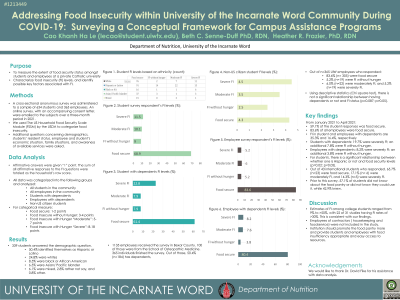Back

Objectives: The purpose of this project was to measure the extent of food security status, characterize food insecurity (FI) levels, and identify possible key factors associated with food insecurity among UIW students and employees.
Methods: A cross-sectional research design was used to assess food insecurity amongst the UIW population. Survey data was collected from a convenience sample of 496 students and 335 employees. Two versions of an anonymous online survey and consent letter were emailed to the subjects, active from January 2021 and ending in April 2021. We used The US Household Food Security Scale Module (FSSM) by the USDA to categorize food insecurity based on demographics, education level, students’ resident status, economic situation, family situation, housing, kitchen equipment, and self-evaluated kitchen skills. Descriptive statistics such as Chi-square, Pearson chi-square, and Spearman correlation tests were used to analyze response data.
Results: Results showed that 59.1% of the UIW student population was food secure, regardless of whether they have dependents or not. Food insecurity in students and employees with dependents from both surveyed campuses was reported to be 35.3% and 16.4% respectively from 2020 to April 2021. Among students with dependents surveyed, 19.7% were severely FI; an additional 7.8% were FI without hunger. There is a significant relationship between whether one is Hispanic or not and food security levels (p=0.02; p< 0.05). Factors more decidedly associated with food security/ insecurity included Hispanic/Latino background (p=0.02) and living with dependent(s) (p=0.01). Employment status has no significant correlation with food security status (p=0.051). There is no significant correlation between citizenship status and food security levels observed (p >0.05; p=0.676).
Conclusions: Food insecurity climbed during the COVID-19 pandemic for the UIW community, affecting vulnerable populations. It is particularly in this current crisis that the UIW ministry should screen students and employees for food insufficiency to provide appropriate support and access to resources.
Funding Sources: The current budget estimate for the investigator is $200 provided by UIW, which will be used to purchase eight $25 VISA gift cards that eight participants have a chance to win through a raffle.
COVID-19 and Nutrition
(PO05-22-22) Addressing Food Insecurity Within University of the Incarnate Word Community During COVID-19: Surveying a Conceptual Framework for Campus Assistance Programs

- CL
Cao Khanh Ha Le, Master's
– Student, University of the Incarnate Word, Austin, Texas, United States - BS
Beth Senne-Duff, PhD
– Associate Professor, University of the Incarnate Word, san antonio, Texas, United States
Presenting Author(s)
Co-Author(s)
Disclosure(s):
Cao Khanh Ha Le, Master's: No relevant financial relationship(s) with ineligible companies to disclose.
Objectives: The purpose of this project was to measure the extent of food security status, characterize food insecurity (FI) levels, and identify possible key factors associated with food insecurity among UIW students and employees.
Methods: A cross-sectional research design was used to assess food insecurity amongst the UIW population. Survey data was collected from a convenience sample of 496 students and 335 employees. Two versions of an anonymous online survey and consent letter were emailed to the subjects, active from January 2021 and ending in April 2021. We used The US Household Food Security Scale Module (FSSM) by the USDA to categorize food insecurity based on demographics, education level, students’ resident status, economic situation, family situation, housing, kitchen equipment, and self-evaluated kitchen skills. Descriptive statistics such as Chi-square, Pearson chi-square, and Spearman correlation tests were used to analyze response data.
Results: Results showed that 59.1% of the UIW student population was food secure, regardless of whether they have dependents or not. Food insecurity in students and employees with dependents from both surveyed campuses was reported to be 35.3% and 16.4% respectively from 2020 to April 2021. Among students with dependents surveyed, 19.7% were severely FI; an additional 7.8% were FI without hunger. There is a significant relationship between whether one is Hispanic or not and food security levels (p=0.02; p< 0.05). Factors more decidedly associated with food security/ insecurity included Hispanic/Latino background (p=0.02) and living with dependent(s) (p=0.01). Employment status has no significant correlation with food security status (p=0.051). There is no significant correlation between citizenship status and food security levels observed (p >0.05; p=0.676).
Conclusions: Food insecurity climbed during the COVID-19 pandemic for the UIW community, affecting vulnerable populations. It is particularly in this current crisis that the UIW ministry should screen students and employees for food insufficiency to provide appropriate support and access to resources.
Funding Sources: The current budget estimate for the investigator is $200 provided by UIW, which will be used to purchase eight $25 VISA gift cards that eight participants have a chance to win through a raffle.

.png)
